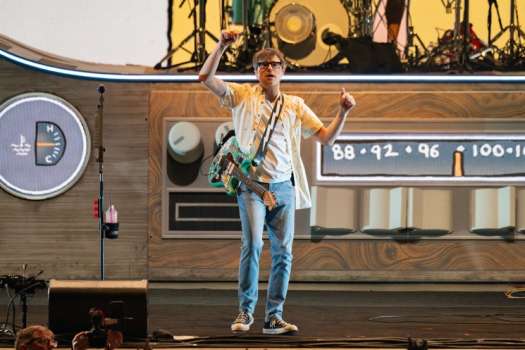Stepping out from their main gigs with Last Ex, FET.NAT and VICTIME on the self-titled debut from their new project Album, Olivier Fairfield and Simon Provencher convene for a glitchy, freak-forward electroacoustic cousin to the frenzied breakscapes of IDM's mid-'90s drill 'n' bass.
Rendered more immediately eccentric with soft-scrambled narrative fragments and melted jazz cheese that brings down the net BPM, no one will confuse the Hull, QC-based duo's debut for some lost record from Amon Tobin or Squarepusher, but it's still worth considering the project's relationship to nostalgia. There are obvious gestures to late 20th century technophobia and its obsession with economic collapse ("108 Y2K Voice"), but there are also apparent tributes to more contemporary uncanny valley virtual assistants ("Google Rap Hommage"), and "New and Annoying" suggests a progress hangover that feels endless — if computers have advanced to the point where they can do everything, why bother trying?
Fairfield and Provencher are looking to the past and going back to the future, this time inverting the subgenre's sampladelic complexity, jamming the songs out in the studio on drums and guitar before filling them out with drowsy DX7 swells, fretless bass, and vocals rendered nearly indecipherable by some unspoken machine, extracting samples from the results, and deploying them how they see fit — the final product leans more toward well-stewarded sessions that add up to an album than robotic, pointillist applications of found sounds.
There's a clear preference for instinctual programming over mathematical complexity, which also makes sense of the project's SEO-unfriendly name: even if Album's Album is just a collection of glitchy jazzbo flare-ups, Fairfield and Provencher are practically daring the algorithms to prove them wrong. Album sounds like it's making sense of a culture in generative limbo, radiating sound environments busied with gestures in every direction while simultaneously communicating a kind of stalemate, with tracks often terminating on a loose note that goes nowhere. Even when Fairfield's drum syncopations achieve a racing propulsion on "165 Refrains," the push-and-pull tension effectively creates the musical equivalent of watching an overactive loading bar skip forward and backward while waiting for a software update.
The difference here is that a computer — or a sequencer, for that matter — replicating the timbral complexities of analogue instrumentation is still nearly impossible. Those devices can help those means achieve new sounds and so they shouldn't be abandoned, but they can't be allowed to become barriers to the latter's possible futures, either.
(Telephone Explosion)Rendered more immediately eccentric with soft-scrambled narrative fragments and melted jazz cheese that brings down the net BPM, no one will confuse the Hull, QC-based duo's debut for some lost record from Amon Tobin or Squarepusher, but it's still worth considering the project's relationship to nostalgia. There are obvious gestures to late 20th century technophobia and its obsession with economic collapse ("108 Y2K Voice"), but there are also apparent tributes to more contemporary uncanny valley virtual assistants ("Google Rap Hommage"), and "New and Annoying" suggests a progress hangover that feels endless — if computers have advanced to the point where they can do everything, why bother trying?
Fairfield and Provencher are looking to the past and going back to the future, this time inverting the subgenre's sampladelic complexity, jamming the songs out in the studio on drums and guitar before filling them out with drowsy DX7 swells, fretless bass, and vocals rendered nearly indecipherable by some unspoken machine, extracting samples from the results, and deploying them how they see fit — the final product leans more toward well-stewarded sessions that add up to an album than robotic, pointillist applications of found sounds.
There's a clear preference for instinctual programming over mathematical complexity, which also makes sense of the project's SEO-unfriendly name: even if Album's Album is just a collection of glitchy jazzbo flare-ups, Fairfield and Provencher are practically daring the algorithms to prove them wrong. Album sounds like it's making sense of a culture in generative limbo, radiating sound environments busied with gestures in every direction while simultaneously communicating a kind of stalemate, with tracks often terminating on a loose note that goes nowhere. Even when Fairfield's drum syncopations achieve a racing propulsion on "165 Refrains," the push-and-pull tension effectively creates the musical equivalent of watching an overactive loading bar skip forward and backward while waiting for a software update.
The difference here is that a computer — or a sequencer, for that matter — replicating the timbral complexities of analogue instrumentation is still nearly impossible. Those devices can help those means achieve new sounds and so they shouldn't be abandoned, but they can't be allowed to become barriers to the latter's possible futures, either.




